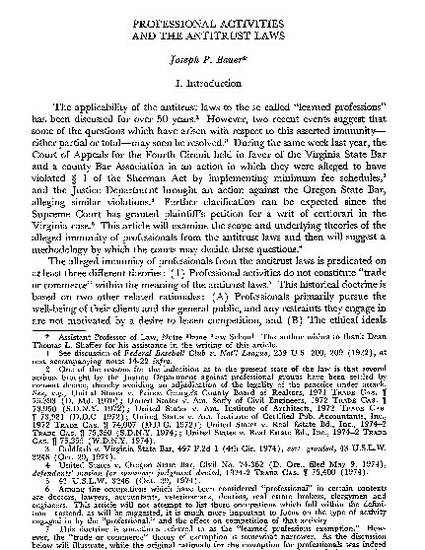
Few subjects in international law raise such incorrigible conflicts of interest as the exercise of extraterritorial jurisdiction in the antitrust context. As one commentator asked with respect to a U.S. court's assertion of jurisdiction over British defendants, "[h]ow could American law, how could an American judgment applying American law possibly vary the rights and obligations created by an English contract to be performed outside the United States?" Indeed, international law is based on the notion that a state occupies a definite territory, within which it normally exercises exclusive jurisdiction.
Yet this traditional doctrine of "territorial jurisdiction" has slowly given way to more and more assertions of "extraterritorial jurisdiction" and international law has reluctantly recognized such encroachments. Most significantly, the past forty to fifty years have evidenced a remarkable willingness by courts, especially courts in the United States, to assert jurisdiction over foreign defendants when their foreign conduct produces adverse effects upon domestic commerce. Proponents argue that such extraterritorial jurisdiction is necessary for a state effectively to regulate the anticompetitive activities of foreign undertakings. Opponents counter that a liberal understanding of territoriality can easily address such concerns without sacrificing fidelity to the fundamental principles of international law, among them the principle of sovereign equality of states.
In broad strokes, this divergence of perspectives represents the respective views of the United States and the European Community regarding the extraterritorial application of antitrust laws. This Article compares the differing approaches of the United States and the European Community as they wrestle with the question of how to regulate foreign anticompetitive activity. More specifically, this Article highlights the distinctive features of the U.S. "effects doctrine" and the European Community's "implementation approach" and analyzes the differences that exist between the two systems. Only the U.S. doctrine openly provides for the consideration of international comity concerns, but both approaches have been used liberally to assert jurisdiction over foreign defendants.
Available at: http://works.bepress.com/joseph_bauer/33/

Reprinted with permission of Notre Dame Law Review (previously Notre Dame Lawyer).